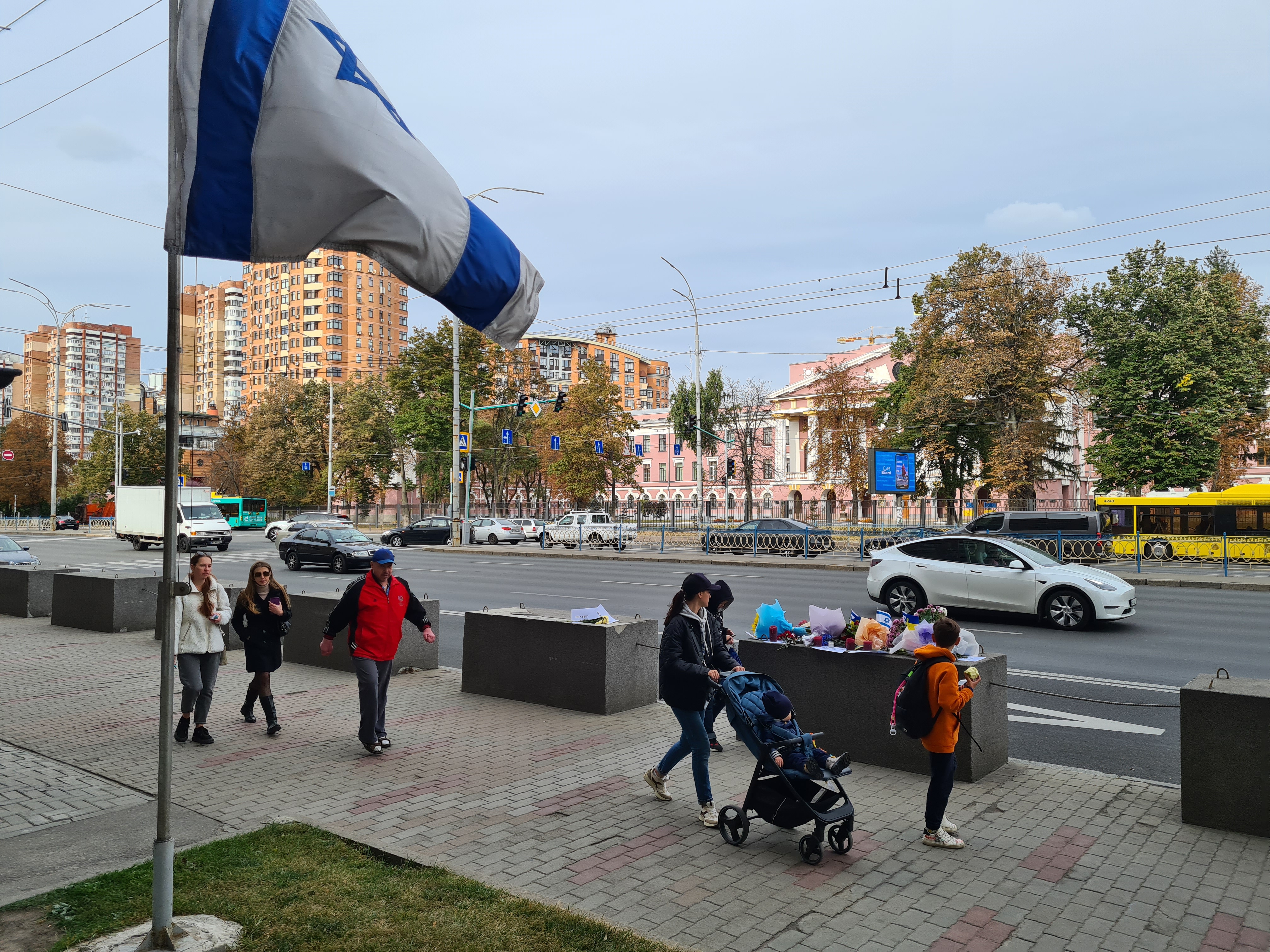
Kyiv, Ukraine – To Valentina Boyko, what’s happening in Ukraine and Israel is strikingly similar.
“We were attacked. They were attacked. Both attacks were stealthy, backstabbing,” the Kyiv resident told Al Jazeera, referring to Russia’s invasion of her homeland and the Hamas-Israeli war that began on Saturday.
Just metres away from her, lying on one of the concrete slabs that surround the Israeli embassy in Kyiv, were fresh flowers and pieces of paper reading “Praying for Israel” in English and Ukrainian.
Boyko’s opinion is shared by many in Ukraine, despite Tel Aviv’s refusal to provide air defence systems to Kyiv and sanction Moscow, as well as Israel’s steps to temporarily suspend visa-free travel for Ukrainians and restrict the arrival of refugees.
Historic ties seem stronger than current disagreements – a mere century ago, what is now Ukraine was home to one of the largest diasporas of Ashkenazi Jews and the birthplace of Hasidism, a reformist doctrine in Judaism.
Volodymyr Zelenskyy, who won Ukraine’s presidency in 2019 by the largest landslide in the country’s history, and some of his cabinet members are proud of their Jewish roots.
“I have Jewish blood. And I’m president. And nobody cares, right?” Zelenskyy told The Times of Israel in 2020.
The fact and the phrase would seem impossible to Nikolai Gogol, Ukraine’s most celebrated author, who described how Cossacks killed Jews with habitual, thoughtless cruelty.
However, Zelenskyy’s heritage does not guarantee an overwhelming approval by Israelis of everything he says and does.
His March 2022 address to Israeli lawmakers was lambasted for his comparison of the Russian-Ukrainian war with the Holocaust and his scathing criticism of Israeli-Russian ties.
However, as the war with Russia approaches its 600th day and the annexation of Crimea nears its 10th anniversary, many Ukrainians see Israel as a nation that thrives despite a decades-long conflict – and one that has advanced weaponry and intelligence services that minimise risks for civilians.
The idea proved outdated on Saturday, when Hamas unleashed surprise attacks on Israel from the Gaza Strip, killing and kidnapping hundreds – and catching Israeli intelligence and military off guard.
“Hamas de-sacralised the myth about the Israeli defence sector. Turns out that Israel wasn’t ready for the invasion neither technically nor technologically,” Kyiv-based analyst Aleksey Kushch told Al Jazeera.
He sees similarities between Hamas leaders and those in the Kremlin, who can mobilise their subjects against their neighbours.
“In the 21st century, a consumer and information society is not ready for a total war. That’s an axiom. But poor and ideologised societies are ready for it,” he said.
The Hamas-Israeli war may also convince Ukrainians to seek membership in NATO even more doggedly.
“Recent events will somehow tarnish Israel’s image from the viewpoint of maintaining their security and will prompt more critical attitude to all formats of US security ‘guarantees’ beyond NATO,” Kyiv-based expert Vyacheslav Likhachev told Al Jazeera.
Before Russia’s full-scale invasion of Ukraine, Kyiv and Tel Aviv had a “good level of mutual understanding,” he said.
But last year’s return to power of Israeli Prime Minister Benjamin Netanyahu, who has long boasted of his “special” ties with Russian President Vladimir Putin, galvanised the dissatisfaction.
“The Ukrainian public, with its sensitivity sharpened by the collective trauma, also began to somewhat childishly get vexed with Israel,” Likhachev said.
Some 43 percent of Ukrainians were opposed to Tel Aviv’s refusal to supply arms, but a third still “understands and accepts” the decision, according to a January poll by the Kyiv International Institute of Sociology.
Some 52 percent of Ukrainians still consider Israel a “friendly nation,” and only 12.5 percent disagree, the poll said.
“The current public opinion about Israel is truly strategically balanced because potentially (and in some practical aspects – right now) Israel is Ukraine’s important partner,” the poll’s organisers concluded.

And even Ukrainian far-right groups and their lionisation of figures who contributed to the Holocaust do not affect the attitude.
In Ukrainian-Israeli ties, every year used to begin with an almost ritual diplomatic spat.
Before the full-scale Russian invasion, thousands used to march with torchlights on January 1, the birthday of Stepan Bandera, a Ukrainian nationalist who briefly sided with Nazi Germany to fight with Communist Moscow during World War II.
And even though Bandera was thrown in a German concentration camp after a falling out with the Nazis, and was poisoned in Munich in 1959 by a Soviet assassin, Israel lambasts him and his supporters for their role in the mass killings of Ukrainian Jews.
So, hours after the marching nationalists would stop chanting “Bandera is our father, Ukraine is our mother” on the streets of Kyiv, the Israeli embassy would issue a protest denouncing the march.
But despite their penchant for carefully staged street rallies, Ukrainian far-right groups have little political clout, which has diminished even further during the war.
And another annual event would prove how dismal and insignificant anti-Semitism in Ukraine has become.
Every October, tens of thousands of Hasidic Jews flock to the grave of Rabbi Nachman, who founded the Breslov branch of Hasidism and asked his followers to visit his grave in the central Ukrainian city of Uman.

Even though Russian cruise missiles reached Uman several times, killing two dozen people, more than 32,000 pilgrims still thronged the streets near Nachman’s grave in mid-September.
“Nothing can stop them, their faith and determination are too strong,” Uman resident Alex Melnik, whose family has for years rented their apartment to pilgrims, told Al Jazeera.
And as reports from Israel and the Gaza Strip dominate news broadcasts and front pages, some Ukrainians have very simplistic explanations for who and what is behind the conflict.
“Russia helped Hamas start this war because Putin wants to distract the world from our war,” Roman Zhelyabenko, who fled his Russia-occupied city of Berdyansk in southeastern Ukraine for Kyiv last year, told Al Jazeera.







